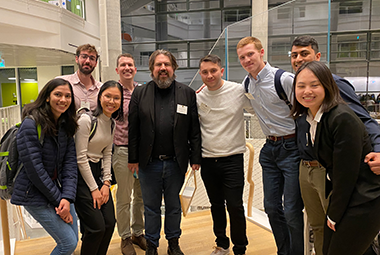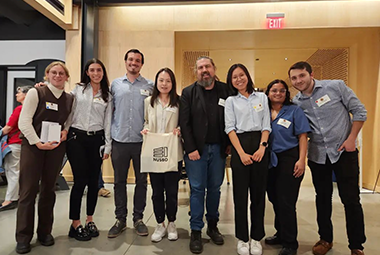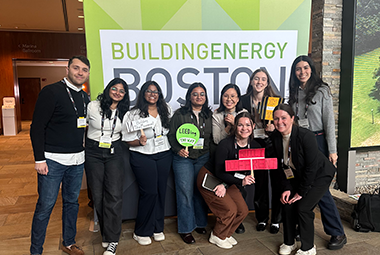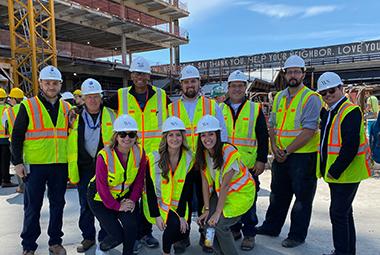Flexible, Interdisciplinary, and Industry-Aligned Sustainable Building Systems Program

Jose Velazquez, MS’24, sustainable building systems, worked full time while completing his master’s degree at Northeastern. Velazquez applied the knowledge he gained in class directly to his position at C&W Services.
Jose Velazquez, MS’24, sustainable building systems, was looking for a master’s program flexible enough to allow him to continue working 40 hours a week as a building engineer at C&W Services. Northeastern’s accommodating master’s programs drew him to the school over all other universities in Boston; he was allowed to take one class per semester. The vast course offerings give students the ability to customize their education to their interests and necessary industry skills.
“The interdisciplinary opportunities at Northeastern are exhaustive, and anyone can take advantage of them,” Velazquez says. “The value I got out of the sustainable building systems program is unmatched, particularly from the sheer number of departments that offered courses and the classes available.”

Course curriculum and faculty mentorship advanced Velazquez’s knowledge as a building engineer. He credits Schaffner for his guidance in transitioning to a sustainability expert in the industry.
He initially enrolled in the energy systems program, but one elective course changed the trajectory of his career. Velazquez was inspired by the teachings of Christopher Schaffner, sustainable building systems part-time lecturer, in the sustainable engineering systems for buildings course, and he switched his master’s degree to the sustainable building systems program.
“During that class, I learned that there was a whole program related to sustainable buildings. It was the first time that I had a theoretical background in the technologies that I was already using in the field,” Velazquez says. With the switch he studied the same field he was working in every day. Velazquez says there is a “kind of beauty in seeing first-hand what I am learning in class”, that encourages an intellectual prowess he could not reach in typical curriculums.
Influential professors and course curriculum
Velazquez emphasized the value of learning from professors with industry experience. He credits changing his career path from a building engineer to a sustainability expert to the academic and life lessons his professors shared in class. The combination of industry experience and academic excellence created a unique learning environment that bridged theory and practice. His experience of simultaneously working full-time in the field and studying resulted in both professional and academic success. Velazquez says, “I think it’s important that my professors have real-world experiences. It really added to each course and helped me bridge the gap between my industry experience and the theory taught in class. My bosses gave me more responsibilities because what I was learning in class was up to date with new industry standards and practices.”
Schaffner’s role as a professor and as the founder of The Green Engineer, a leading sustainability consulting firm, brought a perspective that Valazquez says was “priceless in [his] learning”. Schaffner’s lessons concentrated on the required concepts, but he also emphasized the importance of client management and shared stories of his experiences in the field. After attending Velazquez’s presentation for NUSBO (NU: Sustainable Building Organization), where he shared real-world building control systems demonstrations, Schaffner invited him to be a regular guest speaker in his classes.
 |
 |
Velazquez attended the Building Energy Boston hosted by NESEA with Schaffner and other NUSBO members. He presented as a Fall 2024 alumni speaker at a NUSBO Speaker series.
Velazquez’s perspective on the benefits of academic research was influenced by Matthew Eckelman, associate professor of civil and environmental engineering. Eckelman spoke about his research in a class Velazquez was taking. He highlighted that academic research is where boundaries of what can be done are pushed and “questions that may seem too farfetched or too into the future can be answered,” Velazquez says. Inspired by Eckelman’s passion for the impact academic research has on the industry, Velazquez joined a Northeastern research lab.
Research position at the ABLE Lab
Velazquez worked part-time at Northeastern’s Automation and Built Living Environment (ABLE) Lab led by the principal investigator, Michael Kane, assistant professor of civil and environmental engineering. The lab is part of the Building Operators: Grid and Occupants training project funded by the U.S. Department of Energy and jointly worked on by project partners from the Northwest Energy Efficiency Council (NEEC), Washington State University (WSU) Integrated Design+Construction Lab (ID+CL), and Boston Public Schools.
The project aims to create a training platform that merges two technologies, energy modeling and building management systems—how buildings are controlled—for vocational technology high schools and community colleges, improving entry-level building operators’ understanding of energy systems. Velazquez’s role was to aid in designing the simulator, or the “gamified” whole-building control simulator that models building physics, grid interactions, and occupants, allowing trainees to test how their decisions affect building energy dynamics without damaging any real buildings. Velazquez’s work at the lab combined the expertise of his day job and his academic interests, allowing him to contribute his specialized knowledge while also developing his research skills.
“The reason why I was such a perfect fit for the team was because of what I do almost every day at my job. For the past four years, part of my job has been training building engineers,” he says. “No one on the team had expertise in the control sector of building automation systems. So, my role as part of the team was to take the energy model that was already spitting out data and put it together with an automation system and make it look like what building operators use.”
His ABLE Lab experience and theoretical coursework provided Velazquez with intellectual challenges that complemented his technical work experience. Upon graduating in December 2024, he was promoted to energy and commissioning engineer at C&W Services. He supports the WS Development account by commissioning new building equipment, managing energy usage on existing assets, and training recently hired building engineers.

Throughout his Northeastern journey, Velazquez continued to work full-time at C&W Services. He was promoted upon graduation.
Career ambitions blend passion for sustainability and education
Velazquez sees himself transitioning from industry to academia. He was inspired by David Fannon, associate professor of civil and environmental engineering and architecture, and his mindset that by teaching, he can have more of an impact on global sustainability than on his own. Velazquez believes that academia holds the greatest potential for lasting change through groundbreaking research and through teaching. He sees research as a pathway to addressing future challenges in sustainability and teaching as a way to inspire the next generation of sustainable builders.
“I would love to teach eventually, whether it’s in the United States or in Mexico. I want to share the knowledge I gained from a career in sustainable building with the next generation. Climate change is an international issue, and I know I will have more of an impact on global sustainability if I teach students from around the world,” Velazquez says.
Related News: Training the Coming Generation of Grid-Interactive Efficient Building Operators